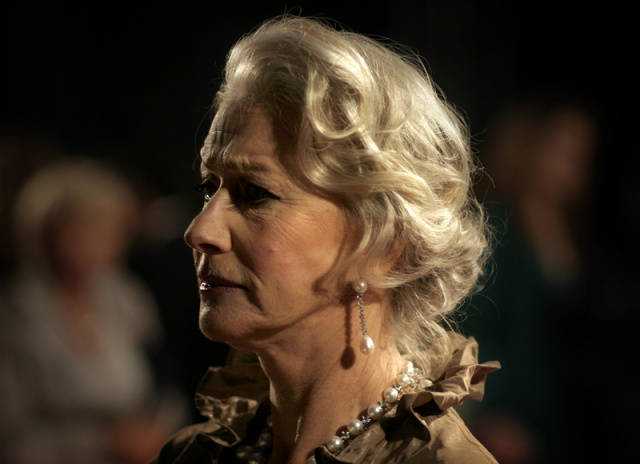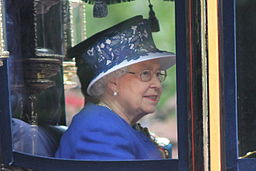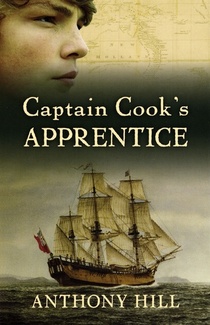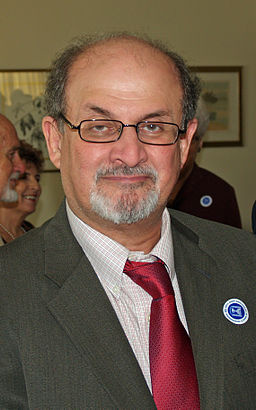An audience...
Say what you like about the uncertain times we live in, there are some things I wouldn't want to change with any other century.
Actually, there are many things in which our age excels above all others: but two that I'm thinking of in particular are the brilliance of modern medicine, and our magnificent audio-visual communications. For the one gives us the physical health with which to enjoy the other.

Dame Helen Mirren, 2008. By Caroline Bonarde Ucci
The thought came to me quite forcefully the other day when we had the great pleasure of attending a screening of the British National Theatre's production of The Audience, with Helen Mirren reprising her Oscar-winning role of Queen Elizabeth ... seen this time through the shifting prism of the weekly Audiences with her Prime Ministers from Churchill to David Cameron.
The darkened cinema...
I was sitting in the darkened cinema as the curtain went up on Act Two, thinking how fortunate we were, as the beneficiaries of modern technology, to be present – in an emotional sense at least – at a performance of this fine play in London, on the other side of the world.
To be sure it was a film; but such was the intensity and dramatic honesty of Mirren's performance, there were times you felt yourself to be in the very theatre ... if not the presence of Her Britannic Majesty herself.
It's sometimes said that a filmed version of a stage work lacks the immediacy and excitement of being physically present in the auditorium. Perhaps. Agreed. But there are the advantages of the cinema's close-ups and medium shots when you can concentrate on the action.
And in any event, when you are offered performances of this quality ... and it's just as true for the screenings at an affordable price of The Met operas (assuming you can get a ticket in New York) or the Bolshoi ballets ... the dilution amounts to adding a little water to a good single malt whiskey. Not quite as strong. But still palatable. And much to be preferred to going without.

HM The Queen, 2013. By Carfax2
Certainly in this play the strength, vulnerability, dignity, loneliness, frailty, humour and sense of duty borne by people under the burden of responsibility resonated from the stage of the Gielgud Theatre as the splendid cast portrayed the characters not just of The Queen, but also her Prime Ministers over the past 60 years.
Among those who remained with me were Haydn Gwynne as Margaret Thatcher, and Richard McCabe as Harold Wilson, said to be the Queen's favourite among her PMs.
Behind the scenes
Another advantage of the cinema versions is that you have the chance to go behind the scenes ... to get what, for me, is the always fascinating view from backstage ... and to hear interviews with some of the cast and creative team.
This time The Audience featured a conversation at interval between the playwright, Peter Morgan (who also wrote the film The Queen), and a rather gushing interviewer who kept trying to press him as to his sources and how did we, as the audience, know that what we were seeing up there on the stage was "true"?
Mr Morgan, who remained pretty stoic I thought, replied that he'd researched the times.
He had a fair idea of what a monarch and her PM would have discussed on these occasions.
He'd spoken to a number of people, who clearly wished to remain confidential – for these meetings are private, no notes or records are made, and the participants are not supposed to discuss them with anyone else.
The words given to the actors were of course his own. In that sense the drama was a fiction.
But then he added, with a great deal of insight, a remark to the effect that while his play may not be accurate in a literal way, he hoped it was truthful.
Literary truths...
Truthful, that is, to the historical period, events, and characters of the people being portrayed.
Truthful in its recreation of a perceived reality, within the artificial conventions of the theatre.
Truthful in its depiction of the human dilemma, and the vicarious response to that by its own audience ... that is to say, by the honest recognition of such emotions and truths within ourselves.
Which of course is what every creative artist – and certainly what every writer of historical fiction – tries to achieve.
 In my own case, for example, however precise I sought to be in Captain Cook’s Apprentice with details of the Endeavour voyage and the life aboard ship, I was aware it could never be absolutely accurate in a realistic sense.
In my own case, for example, however precise I sought to be in Captain Cook’s Apprentice with details of the Endeavour voyage and the life aboard ship, I was aware it could never be absolutely accurate in a realistic sense.
Like everything – even what attempts to be factual reportage – it was partial and incomplete. Selective and personal.
The best I could hope was to leave a reader with the truthful impression that the great adventure must have been something like this.
Which is to touch on a broader truth than the immediate and particular one of exactly who said what to whom and when...
Now, I'm not equipped to discuss the deeper theoretical debates about the nature of truth in literature ... the divisions between, say, literary humanists who believe that a text has a "true" meaning which remains for the reader to discover, and post-modernists who think that any "true" interpretation of a work lies with the individual perceptions brought to it by the audience. That one “truth” is as valid as any other.
Relativism...
For what it's worth, my own experience inclines to the latter view, though I’m aware of the difficulties that relativism can lead to.
Yet almost every statement one can make about truth ultimately appears to be subjective. God is Love. That seems true to me. But for some people, God as they conceive is about killing blasphemers. For some people God is Cruel. For some people the truth is that God does not exist.
In my younger university days we once tried to think of an absolute moral precept that was universally true and applicable. The best we could think of was "You should not kill babies for fun." Yet even here the emphasis is on the qualifier, for there are times, such as famine or great danger, when the survival of the tribe may demand that the weaker members be sacrificed.
Now this is a long way from the kinds of theatrical truths Peter Morgan was talking about. Or perhaps not so far.
Human truths...

Thinking about this post I came across a splendid remark on Alexander Atkins bookshelf quoting the author Salman Rushdie on the nature of truth in literature.
Sir Ahmed Salman Rushdie, 2008. By David Shankbone
It means, he said, human truth … not photographic, journalistic, recorded truth, but the truth we recognise as human beings.
About how we are with each other, how we deal with each other, what are our strengths, our weaknesses, how we interact and what is the meaning of our lives…
As every writer would acknowledge, the response to those issues depends almost entirely on the experience, perception and world view of each person sitting in the darkened auditorium or turning the pages of a book.
It’s a constant dichotomy between the author and the audience … selecting, refining, humanising, compressing, enlarging, interpreting and trying to bridge the paradox between truth and accuracy …
... between what seems true and what is true.
So that one hopes the moment will come when a receptive mind will recognise some unexpected meaning and veracity in the words (or the music or the painting) that accords with that person’s true self, and respond with the profoundly satisfied sense of our shared humanity that comes from any great work of art.
As one...
Thus, through the marvels of technology, the Canberra audience at The Audience became as one with audience in London: and indeed we were not simply an audience of spectators, but became active participants up there on the stage with the actors playing Peter Morgan’s version of the Queen’s weekly Audience.
And such is the power of art, there was a moment when you could imagine yourself in Buckingham Palace itself.
Truth? Illusion? Reality? Accuracy? These were things to reflect upon afterwards, in the cold, damp streets outside.
Postscript: I should have added that The Audience was directed masterfully by Stephen Daldry, who also brought us the film Billy Elliot among other works. Helen Mirren received the Olivier Award for Best Actress and Richard McCabe the Olivier Award for Best Actor in a Supporting Role at this year's awards presented by the Society of London Theatre.
Some useful internet links:
www.kylecupp.com/2009/02/truth-in-literature-truth-as.html
http://atkinsbookshelf.wordpress.com/tag/truth-in-literature/
http://global.oup.com/academic/product/language-truth-and-literature-9780199657902?cc=us&lang=en&
Photo credits:
Dame Helen Mirren, 2007 Orange British Academy Film Awards. By Caroline Bonarde Ucci [GFDL (http://www.gnu.org/copyleft/fdl.html) or CC-BY-3.0 (http://creativecommons.org/licenses/by/3.0)], via Wikimedia Commons
HM Queen Elizabeth, Trooping of the Colour, June 2013. By Carfax2 (Own work) [CC-BY-SA-3.0 (http://creativecommons.org/licenses/by-sa/3.0)], via Wikimedia Commons.
Captain Cook's Apprentice. Cover courtesy Penguin Books Australia.
Sir Ahmed Salman Rushdie, New York 2008: By David Shankbone (David Shankbone) [CC-BY-SA-3.0 (http://creativecommons.org/licenses/by-sa/3.0) or GFDL (http://www.gnu.org/copyleft/fdl.html)], via Wikimedia Commons
